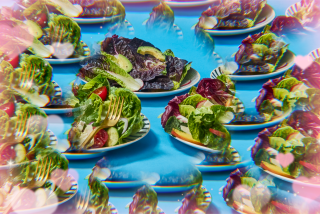Bagged greens: To wash or not to wash
The salad chefs I know fall into two camps: Some serve pre-washed bagged leafy greens straight from the bag. The others insist on washing them first, even though the bag label promises that the contents are “triple-washed.”
Over the years, I’ve ignored those labels too. I typically dumped bagged greens in the salad spinner, added plenty of water and spun strenuously. After writing too many stories about food recalls, I vowed that family and friends were not going to swallow E. coli along with their spring mix and lemon vinaigrette.
Now it seems the straight-from-the-bag camp may have it right after all. By re-washing our greens, we may be making our salads dirtier, according to a bevy of food safety experts.
Even our best-kept kitchens can teem with all sorts of harmful pathogens, on cutting boards and in salad spinners, on knives that just sliced raw chicken, on damp, well-used cloth towels. “In brief, consumers don’t wash up very well and may contaminate produce due to dirty hands and dirty sink,” emailed Christine M. Bruhn, director of the Center for Consumer Research at UC Davis. That’s especially a problem with salad greens, since they never get cooked.
Bruhn coauthored a 2007 article in the journal Food Production Trends that is widely quoted by food safety scholars. Its bottom line: Leafy greens in sealed bags with the “pre-washed” label from a properly inspected facility do not need to be re-washed unless the label directs it.
After reading the article, I decided to halt my re-washing ritual and put the salad spinner in storage.
But the food safety world is awash with advice, and on the subject of clean greens, some of it disagrees.
Food testers at Consumer Reports announced in 2010 that their tests of 208 containers of salad greens turned up bacteria that can indicate contamination, although no E. coli O157:H7 or salmonella, was found. Some experts criticized the methodology but the testers urged consumers to be wary. “Even if the bag says ‘pre-washed’ or ‘triple-washed,’ wash the greens yourself,” they advised.
“We don’t really see the potential for harm that other people do,” said Jean Halloran, Consumer Union’s director of food policy initiatives.
Then my editor, long a re-washer himself, spotted a bag of pre-washed salad at his local market with a label suggesting a rinse. I checked my own refrigerator and found a bag of organic baby spinach with this label: “Triple washed. Rinse with cool water to refresh.”
Are merchants trying to pacify both camps, the re-washers and the non-washers?
I began asking other experts about their own salad-making rituals. None of the people I spoke to washed pre-washed bagged salads.
“Don’t wash it,” responded Douglas Powell, publisher of barfblog.com and professor of food safety at Kansas State University.
“Out of the bag,” said Robert Buchanan, professor and director of the Center for Food Safety and Security Systems at the University of Maryland.
But some, like microbiology professor Michael Doyle at the University of Georgia, forego bagged greens altogether, just to be safe. “We eat a lot of vegetables,” Doyle said. “We eat a lot of lettuce. We buy heads and peel off the outer layers.”
Friends in Santa Monica invited me over to dinner a few weeks ago. A bowl on their kitchen counter overflowed with fresh leafy greens in all sorts of shapes and colors, including oak leaf lettuce and sorrel.
My friends raise a panoply of greens in their front yard. They do not buy bagged salads. They sent me home with a large plastic bag stuffed with greens that make commercial bagged greens taste like shredded paper towels.
Maybe it’s time to invest in seed packets.
Deborah Schoch is a senior writer at the California HealthCare Foundation Center for Health Reporting. Contact her at mdschoch@usc.edu.
More to Read
Eat your way across L.A.
Get our weekly Tasting Notes newsletter for reviews, news and more.
You may occasionally receive promotional content from the Los Angeles Times.









